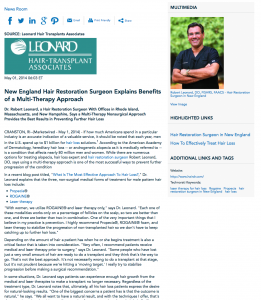New England Hair Restoration Surgeon Explains Benefits of A Multi-Therapy Approach

Dr. Robert Leonard, a hair restoration surgeon with offices in Rhode Island, Massachusetts, and New Hampshire, says a multi-therapy nonsurgical approach provides the best results in preventing further hair loss.
Cranston, RI – If how much Americans spend in a particular industry is an accurate indication of a valuable service, it should be noted that each year, men in the U.S. spend up to $1 billion for hair loss solutions.¹ According to the American Academy of Dermatology, hereditary hair loss – or androgenetic alopecia as it is medically referred to – is a condition that affects nearly 80 million men and women. While there are numerous options for treating alopecia, hair loss expert and hair restoration surgeon Robert Leonard, DO, says using a multi-therapy approach is one of the most successful ways to prevent further progression of the condition
In a recent blog post titled, “What Is The Most Effective Approach To Hair Loss?,” Dr. Leonard explains that the three, non-surgical medical forms of treatment for male pattern hair loss include:
“With women, we utilize ROGAINE® and laser therapy only,” says Dr. Leonard. “Each one of these modalities works only on a percentage of follicles on the scalp, so two are better than one, and three are better than two in combination. One of the very important things that I believe in my practice is prevention. I highly recommend Propecia®, ROGAINE® foam, and laser therapy to stabilize the progression of non-transplanted hair so we don’t have to keep catching up to further hair loss.”
Depending on the amount of hair a patient has when he or she begins treatment is also a critical factor that is taken into consideration. “Very often, I recommend patients receive medical and laser therapy prior to surgery,” says Dr. Leonard. “Some people who have lost just a very small amount of hair are ready to do a transplant and they think that’s the way to go. That’s not the best approach. It’s not necessarily wrong to do a transplant at that stage, but it’s not prudent because we’re hitting a ‘moving target’. I really try to stabilize progression before making a surgical recommendation.”
In some situations, Dr. Leonard says patients can experience enough hair growth from the medical and laser therapies to make a transplant no longer necessary. Regardless of the treatment type, Dr. Leonard notes that, ultimately, all his hair loss patients express the desire for natural-looking results. “One of the biggest concerns a patient has is that the outcome is natural,” he says. “We all want to have a natural result, and with the techniques I offer, that’s almost a given situation. It’s very disconcerting for most people to lose their hair. So if we can restore it and they don’t have to think about it, it’s a really nice thing. Self-confidence and self-esteem – those are issues we try to treat in addition to giving people more hair.”
About Robert Leonard, DO, FISHRS, FAACS
Dr. Leonard graduated from the University of New Hampshire and earned his Doctorate of Osteopathic Medicine from the University of New England. He has over 27 years experience in the field of hair restoration, and is a nationally recognized expert on hair loss. Dr. Leonard is a Fellow of the International Society of Hair Restoration Surgery, a Diplomate of the American Board of Hair Restoration Surgery and a Fellow of the American Academy of Cosmetic Surgery. He is also a member of numerous medical associations, such as the American Society for Dermatologic Surgery, and the American Society of Hair Restoration Surgery. Dr. Leonard has provided hair loss treatments and hair transplantation surgery to patients in the Rhode Island and Massachusetts communities with offices in Cranston, Boston, Newton Centre, Braintree, Hyannis, and Worcester. Dr. Leonard is available for interview upon request.
For more information about Dr. Leonard and Leonard Hair Transplants and Associates, visit hairdr.com or facebook.com/LeonardHair.
¹Eisner, Robin. “Men Spend $1 Billion Yearly Fighting Baldness.” ABC News. February 14, 2014.
Contact:
Leonard Hair Transplants Associates
922 Reservoir Avenue
Cranston, RI 02910
(401) 946-0884
(800) 543-0660
Rosemont Media
[email protected]
(858) 200-0044
www.rosemontmedia.com

